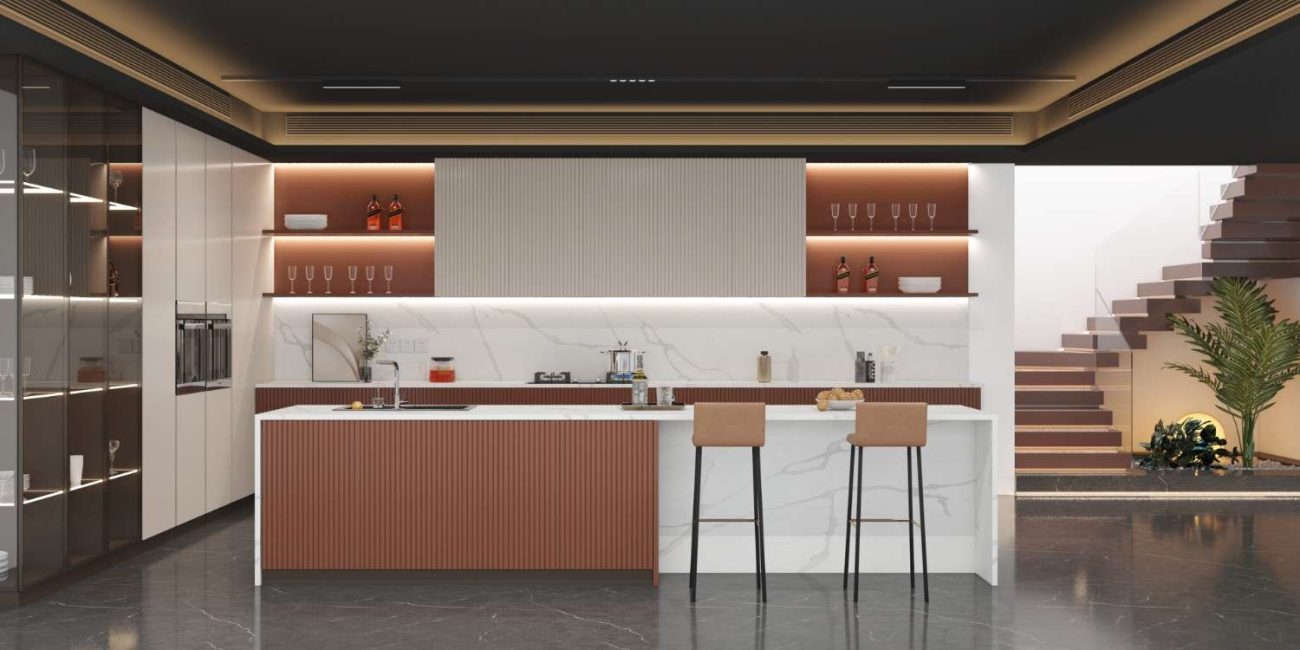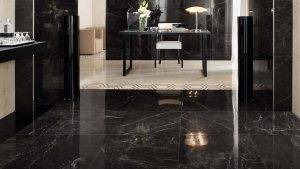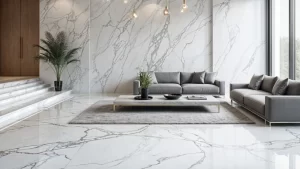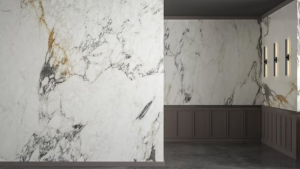Quartz countertops have quickly become a favorite for homeowners, interior designers, and architects due to their appealing blend of beauty, durability, and low-maintenance features. These countertops are becoming popular as a practical alternative to natural stones like granite and marble. In this blog, we’ll explore the key benefits of quartz countertops, why they may be the perfect addition to your kitchen or bathroom, and how they stack up against other materials.
We’ll also discuss common challenges homeowners face with quartz surfaces and provide insights into making the best choice for your home.
What is Quartz and How is It Made?
Quartz is an engineered stone that combines natural quartz crystals with resins and pigments. This process results in a durable and versatile material that is both non-porous and highly resistant to staining. Unlike natural stones like granite or marble, which are mined directly from the earth, quartz countertops are manufactured in factories, allowing for greater consistency in color and pattern.
The creation of quartz involves:
- Crushing quartz crystals: Natural quartz is ground into fine particles.
- Binding with resins and pigments: These materials are added to bind the crystals and enhance color.
- Compression and curing: The mixture is pressed into slabs and hardened, giving it durability and strength.
This engineered process allows quartz countertops to have the look and feel of natural stone but with improved performance.
Advantages of Quartz Countertops
- Durability and Strength: Quartz countertops are incredibly durable and can withstand the daily wear and tear of busy kitchens and bathrooms. Unlike granite or marble, which may chip or crack under impact, quartz is engineered to be more resilient. Whether it’s dropping a heavy pot or accidentally scratching the surface, quartz can handle the pressure.
- Non-Porous Nature: One of the most significant benefits of quartz is its non-porous nature. Quartz countertops do not absorb liquids, making them resistant to stains from oils, juices, and other kitchen spills. This non-porosity also helps prevent bacteria and mold growth, making quartz a hygienic choice for food preparation areas.
- Low Maintenance: Quartz countertops require minimal maintenance. Unlike granite or marble, which need to be sealed regularly, quartz does not require any sealing. Regular cleaning with mild soap and water is enough to keep quartz countertops looking fresh and new. This makes quartz an excellent choice for homeowners who want beautiful countertops without the hassle of constant upkeep.
- Variety of Designs: Quartz countertops are available in a wide range of colors, patterns, and finishes. Whether you prefer a subtle, neutral tone or a bold, dramatic look, there’s a quartz countertop that can match your aesthetic. Because quartz is engineered, it can also be customized to achieve specific design goals, offering endless possibilities.
- Eco-Friendly Option: Quartz countertops are often made with recycled materials, such as glass and stone fragments. This helps reduce waste and makes quartz a more environmentally friendly option compared to natural stones, which require mining. Additionally, quartz countertops last longer, reducing the need for replacements and further conserving resources.
Common Problems with Quartz Countertops
While quartz countertops offer many benefits, it’s essential to be aware of some potential drawbacks:
- Heat Sensitivity: Quartz countertops can be sensitive to extreme heat. The resin used in quartz can warp or discolor when exposed to high temperatures. It’s always advisable to use trivets or heat pads when placing hot pots or pans on a quartz countertop to prevent damage.
- Potential for Cracking: Although quartz is durable, heavy impacts can cause cracks or chips. For example, dropping a sharp object or heavy cookware can leave a mark. While quartz is more resistant to damage than natural stone, it’s still not completely immune.
- Cost Considerations: Quartz countertops tend to be more expensive than laminate options. However, considering their long-term durability, low maintenance, and aesthetic appeal, they can be a worthwhile investment in the long run.
- Resin-Based Issues: Quartz countertops contain resin, which can discolor over time, especially with exposure to UV light. This can be a concern for countertops placed in areas with significant sunlight. However, this issue is generally minimal when quartz countertops are properly maintained.
Quartz vs. Other Countertop Materials
Quartz vs. Granite
- Durability: Both quartz and granite are durable, but quartz is more resistant to staining and scratching. Granite requires sealing, whereas quartz is non-porous and does not require sealing.
- Cost: Quartz is generally more expensive than granite, but it offers a wider range of colors and patterns, making it a more customizable option.
- Maintenance: Quartz is much easier to maintain than granite, which needs regular resealing.
Quartz vs. Marble
- Aesthetics: Marble is known for its luxurious look, but it is more prone to staining and scratching than quartz.
- Maintenance: Marble requires more upkeep and sealing, whereas quartz is low-maintenance and non-porous.
- Durability: Quartz is more durable and resistant to damage compared to marble, which is softer and more prone to chips.
Quartz vs. Laminate
- Durability: Quartz is far more durable than laminate, which can easily get scratched and damaged.
- Aesthetic Appeal: While laminate can imitate the look of stone, quartz offers a more realistic, high-end appearance, making it a preferred choice for homeowners, including those searching for quartz countertops in Sharjah.
- Cost: Laminate is a more budget-friendly option, but quartz provides better value over time due to its durability and low maintenance.
For the best selection, consider visiting a quartz supplier in Sharjah for top-quality quartz countertops.
Where to Find Quartz Countertops in the UAE
When looking to invest in quartz countertops in the UAE, it’s essential to work with a trusted quartz supplier in UAE. Many suppliers offer a variety of colors, patterns, and styles to match your needs. If you’re in Dubai or Sharjah, here are some great options for sourcing high-quality quartz countertops:
- Quartz Suppliers in Dubai: Look for reputable suppliers that provide a wide range of quartz options with customization.
- Quartz Suppliers in Sharjah: Sharjah also offers competitive prices for quartz countertops, with many suppliers specializing in both high-end and budget-friendly options.
- Quartz Countertop in Sharjah: For those located in Sharjah, explore local showrooms and suppliers for excellent quartz options.
- Quartz Countertop in Abu Dhabi: Abu Dhabi residents can choose from a wide variety of quartz countertops, offering a perfect blend of style and durability. Whether for your kitchen or bathroom, a quartz countertop in Abu Dhabi suits various design preferences and functional needs, making it easy to find the ideal fit for your home.
Conclusion
Quartz countertops combine the best of both worlds: beautiful design and superior functionality. With its unmatched durability, low-maintenance requirements, and variety of design options, quartz is a smart choice for any kitchen or bathroom. Though there are some concerns like heat sensitivity and cost, the long-term value and eco-friendly nature of quartz make it a top choice for homeowners. Whether you’re in Dubai, Sharjah, or Abu Dhabi, be sure to explore options with trusted stone suppliers in the UAE to find the perfect countertop for your home.
Frequently Asked Questions
How long do quartz countertops last?
Quartz countertops are highly durable and can last a lifetime with proper care. Their resistance to scratches, stains, and heat makes them a long-lasting investment. With regular cleaning and maintenance, these surfaces retain their beauty and functionality for many years, making them an excellent choice for busy kitchens and bathrooms.
Are quartz countertops more expensive than granite?
Quartz countertops can be slightly more expensive than granite, primarily due to their manufacturing process and material consistency. However, the higher initial cost is often offset by quartz’s low maintenance requirements, as it does not need sealing like granite. Over time, this makes quartz a worthwhile investment for homeowners looking for a durable and low-maintenance solution.
Do quartz countertops require sealing?
No, quartz countertops do not require sealing. Thanks to its non-porous surface, quartz naturally resists staining and bacteria without any additional maintenance. This makes quartz countertops an attractive option for those seeking a hassle-free, long-lasting surface.
Can quartz countertops be repaired if damaged?
Yes, quartz countertops can be repaired if they are damaged. Minor chips or cracks can typically be fixed using specialized adhesives. However, for more extensive damage, it’s best to consult a professional for repairs. With the right care, quartz countertops can remain looking beautiful for years.
Are quartz countertops heat-resistant?
Quartz countertops are heat-resistant to a certain extent but not completely heatproof. To prevent any potential damage from high temperatures, it’s advisable to use trivets or heat pads when placing hot pots or pans on the surface. This simple precaution helps maintain the countertop’s integrity over time.






